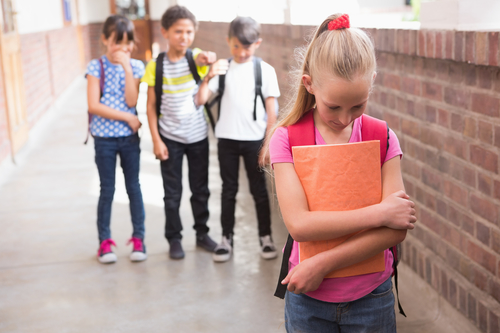
Bullying
While we mental health practitioners share concern with the emotional plight of the bullied victims, there remains the emotional deficiency to be coped with by the bully him/herself.
The Victims:
“Kids who are in religious or ethnic minorities, or are gay or disabled, are more likely to be bullied in school than other kids. Their point of difference can be a point of vulnerability. In the last decade, schools have put more energy into preventing bullying, to the benefit of these kids and others (girls, too, are more frequent targets). And they’ve often had the authority of the courts, state legislatures and the federal Department of Education behind them”.1
The National Centre Against Bullying2 identifies the many different types of bullying that can be experienced by children and adults alike, some are obvious to spot while others can be more subtle.
The different types of bullying that we look at below are some of the ways that bullying could be happening:
Physical bullying
Physical bullying includes hitting, kicking, tripping, pinching and pushing or damaging property. Physical bullying causes both short term and long term damage.
Verbal bullying
Verbal bullying includes name calling, insults, teasing, intimidation, homophobic or racist remarks, or verbal abuse.
Social bullying
Social bullying, sometimes referred to as covert bullying, is often harder to recognize and can be carried out behind the bullied person’s back. It is designed to harm someone’s social reputation and/or cause humiliation.
Cyber bullying
Cyber bullying can be overt or covert bullying behaviors using digital technologies.
The Bully
I am a winner because you are a loser. Recent studies suggest that bullies may actually have normal or above-average self-esteem, at least in terms of their physical attractiveness and popularity, but they also tend to be more “shame-prone.” Clinical psychologist, Mary C. Lama, describes the dynamic in this way: “Shame is what a bully attempts to hide. They are anxious about the exposure of their failures or shortcomings. The bully gives away his shame by denigrating you and, as a result, a bully will make you experience shame about your own inadequacies.” In other words, the bully makes himself a winner at your expense, forcing you to become the shame-ridden loser.3
What NOT to do: 4
1. Keep it to yourself
Bullying is something that affects the majority of people but worryingly, our research revealed that 45% of those who experience it, fail to report it through embarrassment, fear or a lack of faith in support systems.
2. Blame yourself
Remember that the person who is bullying you is the one with the issue, not you. It is in no way your fault.
3. React with violence
Often reacting in an aggressive manner can make the situation worse and can put you at risk of physical harm.
4. Isolate yourself
We know it might feel like the best thing to do, but it will only make things worse in the long run by silencing you and reducing your self-esteem.
5. Think of yourself as a victim
Often people who are bullied can feel like a ‘victim’ but it’s important that you don’t disempower yourself and let the bullying dictate who you are.
6. Neglect your health and mental wellbeing
7. Harm yourself Hurting yourself in any way is not a solution.
What to do:5
- Keep a record of each incident, if possible, for use as supportive evidence. In the event of cyberbullying, record all you can. It is incredibly important you go through the appropriate reporting channels; your first port of call should be confiding in a teacher/parent/guardian/learning mentor or other responsible adult. Even if you don’t want to report it, it is important you share with someone what you are going through.
- You are being bullied not because of your sexuality, gender identity, race, appearance, disability or any other unique factor; it is because of the attitude towards the factor. The only thing possible to change is attitudes. You are perfect the way you are
- Remember to challenge the behavior, not the person, so instead of accusing the person of being a ‘bully’, explain why their actions or words are causing you distress. For example, instead of saying, “You’re upsetting me”, you could say, “What you said/did has upset me”. It might be appropriate to suggest that a teacher or responsible adult hosts a mediation between you and the individual who is doing the bullying.
- Try to keep up with your normal social life and activities you enjoy. The distraction if anything, will help lift your spirits and remind you of the positive things in your life.
- You need to find ways to regain control, confidence and self-esteem. Remind yourself every day that you are worthy, in control and that things will get better.
- It is important during this time, that you take good care of your health and mental wellbeing. As well as finding a support system, you need to make sure you are looking out for yourself too. Little things like eating a balanced diet, working out, getting a good night’s sleep, relaxing and having quality time with friends and family can really improve physical and mental health, which will in turn, reduce stress. Reductions in stress increase your clarity of vision, allowing you to better analyze difficult situations, which will make them much easier to deal with. We also suggest that you seek emotional and mental support from a family doctor, therapist or counselor.
This is where Counseling on Demand comes in. We can work with both bullies and victims. Both need our help and support. Parents, we can help you to help them.
We are online at CounselingonDemand.com
We are only a click away.
- EMILY BAZELON, bullying-in-the-age-of-trump, 16, 2016 NY times, opinion
- org.au/bullying-advice/bullying-for-parents/types-of-bullying
- JOSEPH BURGO,com/health/archive NOV 14, 2013all-bullies-are-narcissists
- Dorg/7-things-shouldn’t-do-if-being-bullied
- Ibid